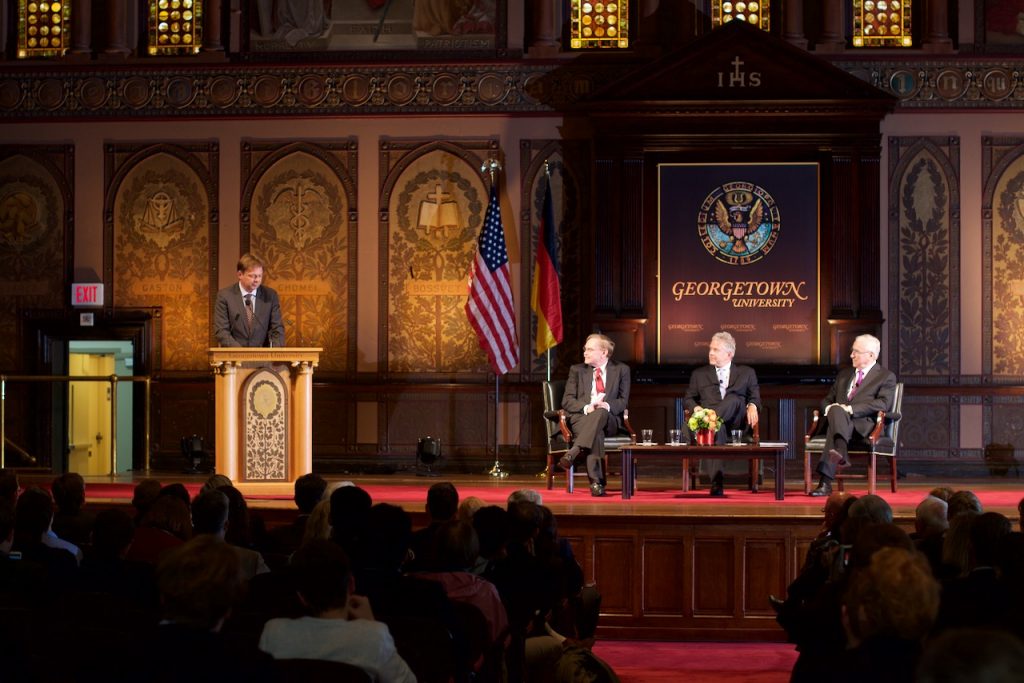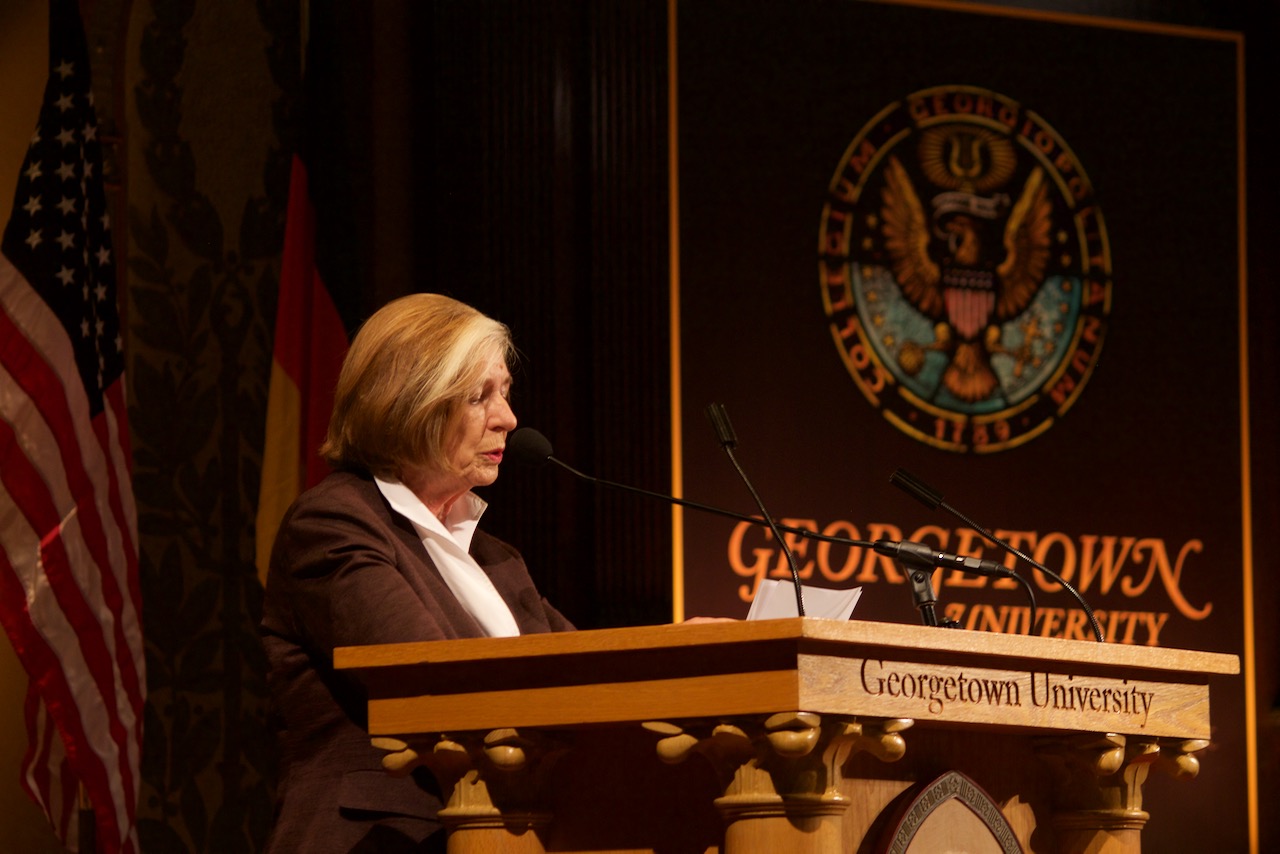Georgetown’s BMW Center for German and European Studies hosted the sixth Herbert Quandt Lecture on Thursday Oct. 1 in Gaston Hall. The lecture, titled “The 25th Anniversary of German Unification: A Conversation with Two Architects,” was centered on the 25th anniversary of German reunification on October 3, this year, and was held in partnership with the Hanns-Seidel-Foundation’s Washington Office and the Konrad-Adenauer-Stiftung.
The Quandt Lecture series focuses on promoting dialogue between nations, and the focus of this lecture was the history of, and to some degree the future of, the relationship between Germany and United States. The two featured speakers, the Former German Federal Minister of Finance and Honorary Chairman of the Christian Social Union (CSU) Dr. Theo Waigel and the Chairman of Goldman Sachs’ International Advisors Robert Zoellick, were both involved in the process of German reunification.
Professor Ursula Männle, Chair of the Hanns-Seidel-Foundation, and Dr. Philipp Ackermann, Deputy Chief of Mission, Embassy of the Federal Republic of Germany gave introductory remarks, focusing on the changes that have come about since reunification in 1990, and the value of hearing from people directly involved in the process itself.
“The Cold War dividing line ran through the middle of Germany for 45 years. Families, friends, a people had been torn apart. When Germany was united on October the third 1990, only three hundred and nine days had passed since the wall had fallen,” Männle said, emphasizing the enormity of the reunification.
Ackermann spoke about the change in the public perception of reunification. “In 1990, Chancellor Kohl promised ‘green pastures’, Blühende Landschaften, in Eastern Germany, and at that time he was scolded for his promise. In hindsight, he was right… Both our federal chancellor and president – who, by the way will be come to Washington next week – are from Eastern Germany, and today, that seems the most normal thing,” said Ackermann.
As the Finance Minister of the Federal Republic of Germany during reunification, Waigel discussed at length the history and political economics of the reunification process. At one point, he summarized a key decision by saying, “I had to take the chance: a budget with a surplus, or reunification. I decided for reunification, and I think I was right.”
Zoellick, former president of the World Bank, served as a Counselor of the U.S. Department of State from 1989 to 1992 and was the chief U.S. negotiator in the “2+4 negotiations,” which restored Germany’s full sovereignty. Zoellick spoke on what he considers the “lessons” of statecraft to be learned from the history of German Unification, such as the importance of anticipation, the force of the story of the people on the ground, and the need to be operational.
Noting the importance of anticipation, Zoellick said, “It’s extremely hard to predict specific events, in our own lives and the world at large, but I do think it’s possible for public officials to have some awareness of the trends and direction and development, so you can try to prepare and position yourself for the future.”

Photo: Josh Raftis/Georgetown Voice
Zoellick’s first example was the change in the European atmosphere with Gorbachev. “You could see the stirrings of excitement in some of the Eastern European countries, and for sure in Germany; this was an incredible phenomenon, created an incredible sense of hope and opportunity. and so one of the challenges for President Bush was how would he position the United States,” said Zoellick.
Zoellick and Waigel both emphasized how improbable the reunification seemed three decades ago. They referenced George H. W. Bush’s speech in Mainz on May 31 1989 titled “A Europe Whole and Free,” in which Bush declared that the United States and Germany shared a new role as partners in leadership. Zoellick, who had worked on that speech and its title, acknowledged that at the time “partners in leadership” had the potential to seem controversial and improbable, but concluded that ultimately Germany and the US are now partners in leadership.
“It was our belief in pure practical terms that a united Germany would inevitably become the most influential country in Europe,” said Zoellcik.
Both speakers made connections between that prediction and contemporary challenges in Europe, such as the financial crisis and the migrant crisis. During the panel, the two were also generally positive when asked if Germany and the United States would continue to lead even given the severity of current economic and social challenges facing Europe, including the growing questions about the euro and the future of the European Union, coupled with the social changes brought by a new rise in right-wing extremism and he demographic changes caused by the influx of migrants.
“I look at Europe today, and I think, ‘what an exciting opportunity here.’ The process never ends, the world never settles down,” said Zoellick.
Waigel was more retrospective in his response, saying, “I was only eighteen years old when the Treaty of Rome was signed, this was a long time ago. Now I am 76 years old, and I can say now with satisfaction that 90 percent of my expectations actually have been fulfilled. I can only hope that the next generations will aslo think like that, and will continue to bear responsibility for developments in Germany and in Europe.”





